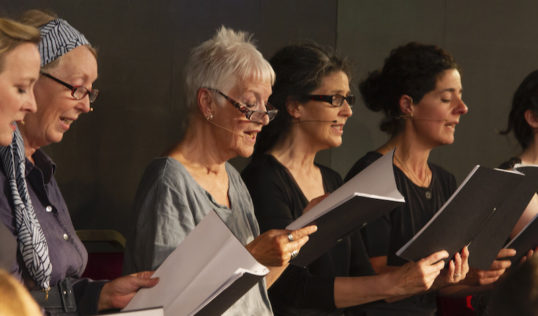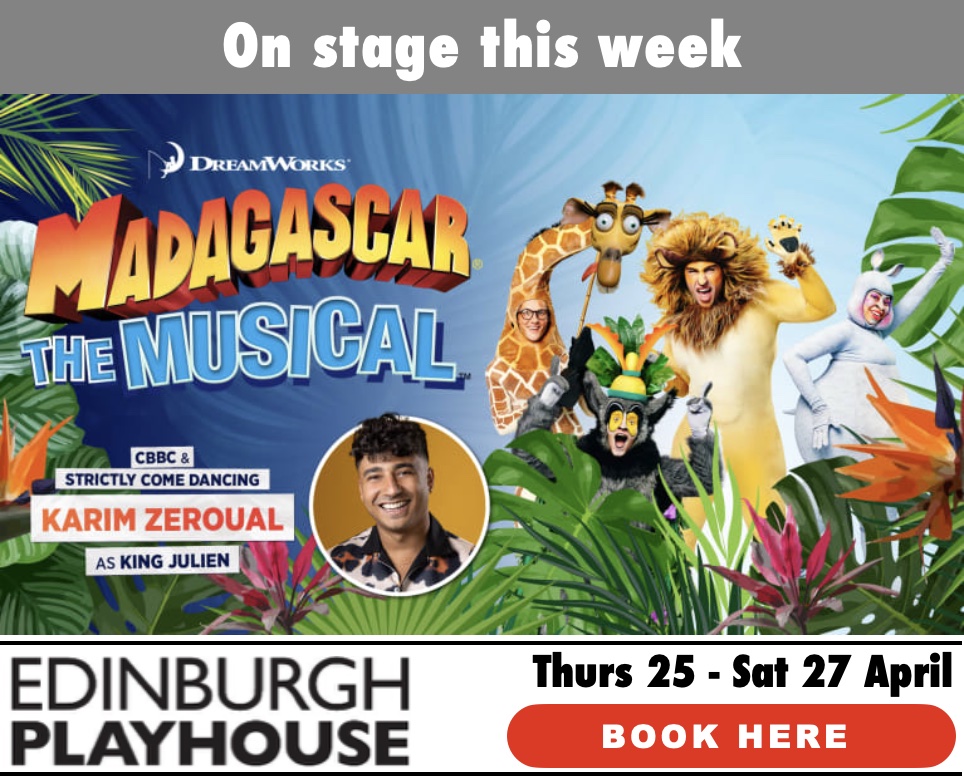BookFest – The Final Whistle
Edinburgh International Book Festival 2019 Final Round-up
By Hugh Simpson
The Edinburgh International Book Festival 2019 closed with its customary eclectic selection of events, a remarkably prescient glitch and a Playing with Books presentation that showed exactly what such an adaptation can do.
The last of the Playing With Books collaborations with the Lyceum, where creatives have a frighteningly short amount of time to stage a response to a recent novel, was based on Women Talking by Miriam Toews, itself a response to a series of sexual assaults in a Mennonite community in Bolivia.
Under the direction of former Traverse head Orla O’Loughlin, a dream cast produced a head-spinningly good display. The apparently descriptive title is loaded with meaning – for a group of women deprived of agency and forbidden to read and write, to be holding a discussion at all is revolutionary – but suggests a radio play on stage.
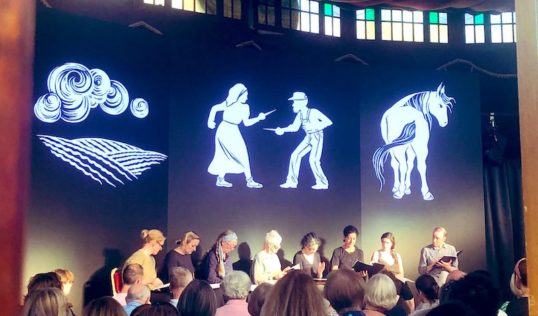
The cast of Women Talking. Pic: Elizabeth Newman.
In a departure from previous events, however, there were no musicians taking part in this production, and instead choreographer Janice Parker was involved. The apparently simple act of ascribing gestures to each performer led to an unexpectedly involving visual element to a row of performers sitting on chairs.
What could have been heavy going had a great deal of light and shade, and was tremendously well paced. A selection of intriguing performers included Lesley Hart, Fletcher Mathers, Kirsty Eila McIntyre, Robin Laing and two giants of Scottish drama in Anne Lacey and Ann Louise Ross. Even in such exalted company, a couple of performances stood out. Anita Vettesse’s Ona was deeply philosophical and otherworldly, while Gabriel Quigley’s Salome was a triumph of focused rage and conflicted humanity.
Linda McLean’s adaptation, albeit only a truncated version of the book’s first part, worked brilliantly on its own terms. It was obviously a huge task to get it down to manageable length, and while the performance dominated the event more than is usual – taking an hour, and leaving little time for the usual exploration of the creative process – this was such a wonderfully achieved work in its own right that no-one could have minded.
If some feel that the continued expansion of the Book Festival, like that of the other festivals, leads to its own problems – the spilling out into George Street does not quite cohere with the rest, and the loss of the dedicated children’s bookshop seems a shame – it still has a thoroughly congenial and intellectually inspiring atmosphere.
make connections and build bridges
As well as it being an unbeatable place to come across intriguing company, the Festival under Nick Barley continues to seek out unheard stories, make connections and build bridges. A cross-genre event commemorating someone who did a great deal to enhance the theatrical appeal of Edinburgh’s public spaces was Christine De Luca and Carlo Pirozzi’s celebration of Pop Art pioneer Eduardo Paolozzi.
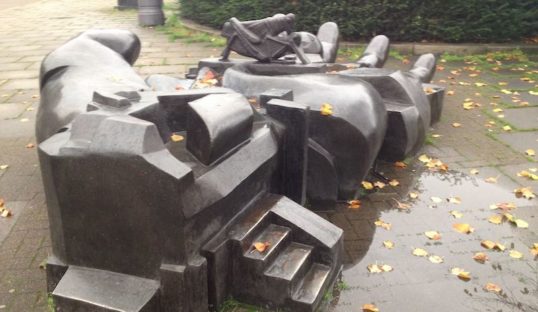
An element of Paolozzi’s The Manuscript of Monte Cassino in its original home outside the Metropolitan Cathedral in Picardy Place. Pic: T Dibdin
Edinburgh’s former Makar De Luca’s poetic responses to Paolozzi’s works are contained in the pair’s book Paolozzi At Large In Edinburgh and – together with Pirozzi’s more factual contributions – made an eloquent case for someone who is not as feted in his home town as such a massive artistic figure should be. Witness the fate of The Manuscript of Monte Cassino, relocated from the guddle at the top of Leith Walk to a garden off London Road. Its return to the Metropolitan Cathedral in Picardy Place is promised, but who knows when that might be.
It surely cannot be the case that Scotland would rather forget about Paolozzi, whose family history does remind us of things we would rather pretend never happened. At any rate, we should be more protective of his legacy – look at what happened to the magnificent murals at Tottenham Court Road underground station, most of which were simply chucked into a skip before anyone thought to ask London Transport what was happening to them.
It is always wise to be suspicious of anyone who characterises football as ‘theatre’, especially as ‘working-class theatre’, which seems to be reserving theatre itself for a moneyed elite and denigrating both activities. Nevertheless, it is instructive that the revenues for football in Europe now outstrip those of all of the continent’s publishers combined, and are now four times that of Europe’s cinemas.
These were among the insights provided by the peerless David Goldblatt, whose The Age of Football is a sequel of sorts to his definitive social and economic history of the sport The Ball Is Round. Dealing with the last two decades, the new book obviously deals heavily with the continuing push for global hegemony, and the shysters, oligarchs and murderously corrupt dictators who have colonised it.
football’s Extinction Rebellion moment
A consummate stylist with a massive frame of reference, Goldblatt is surely the figure in football writing who was sought for so long, someone who has done for the game what CLR James did for cricket writing. He is also very funny, and in his words, ‘even crosser’ than twenty years ago, believing that “football’s Extinction Rebellion moment” is near at hand, and should probably come before the authorities find a way to digitise the crowds.
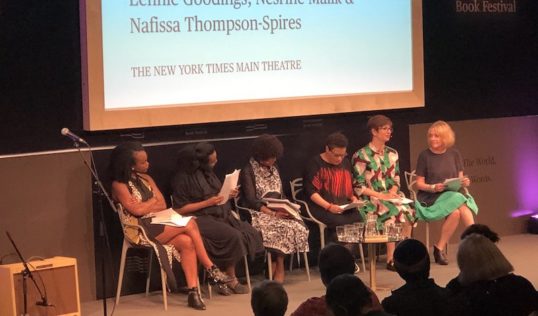
Nafissa Thompson-Spires, Nesrine Malik, Margaret Busby, Jackie Kay, Clara Farmer and Lennie Goodings. Pic @edbookfest
No excuse is necessary for mentioning the Book Festival’s Tribute to Toni Morrison, arranged at short notice but a fitting tribute to that visionary, poetic and hugely important writer. Chaired enthusiastically by Jackie Kay, there was perhaps more about the nuts and bolts of publishing than was ideal, but this did lend itself to some personal anecdotes. It was also far from being a cosy event, with Nesrine Malik querying why it is still regarded as a compliment to say that Morrison’s writing ‘transcended her gender and race’ when no-one would consider that a white male writer had to transcend theirs.
extraordinary metaphor
In a festival dealing with great writers, the most extraordinary metaphor came in the last event in George Street’s Spark Theatre, as a discussion on sustainability and global warming was evacuated due to a fire alert. As the Amazon rainforest burned, Mike Berners-Lee, author of There Is No Planet B, was in the process of explaining how any predictions of how long the human race has to ameliorate climate catastrophe are misleading, as explosions in Antarctica might already be creating an unstoppable feedback loop, when many in the audience became aware of an acrid smell.
Fittingly, a fan trying to cool the audience on what was the hottest ever final August weekend had overheated. Berners-Lee’s engaging, matter-of-fact delivery was not short on warnings; any attempt by industry to talk about the future while not promising simply to leave all fossil fuels in the ground is, he says, simply nonsense. However, he was also clear-eyed and oddly optimistic – although his explanations about how the necessary massive changes to our lifestyles would end up being positive were cut tantalisingly short.
Perhaps a small minority of the audience should have elected a plausible, half-educated leader who could declare themselves sceptical of the very notion of smoke being in any way indicative of fire, and urge us to stay put, learn to accommodate any apocalyptic inferno, and rely on the market to come up with a solution in the future.
However, the youngsters in charge (no doubt motivated by jealousy of the lifestyles of the seated audience, and under the influence of the unelected but sadly fashionable ‘fire’ brigade) chose the knee-jerk reaction of trying to extinguish the blaze while ushering everyone out.
There was no consideration of the views of any scientists who would tell you that being incinerated is not nearly such a bad thing as the doomsayers would have you believe. And there was no attempt at a dialogue with the voices of good old-fashioned common sense who would welcome self-immolation, if only for the welcome rise in temperature it would bring.
But then there is just no reasoning with these zealots.
The Book Festival will return in 2020.
Website: https://www.edbookfest.co.uk
ENDS








